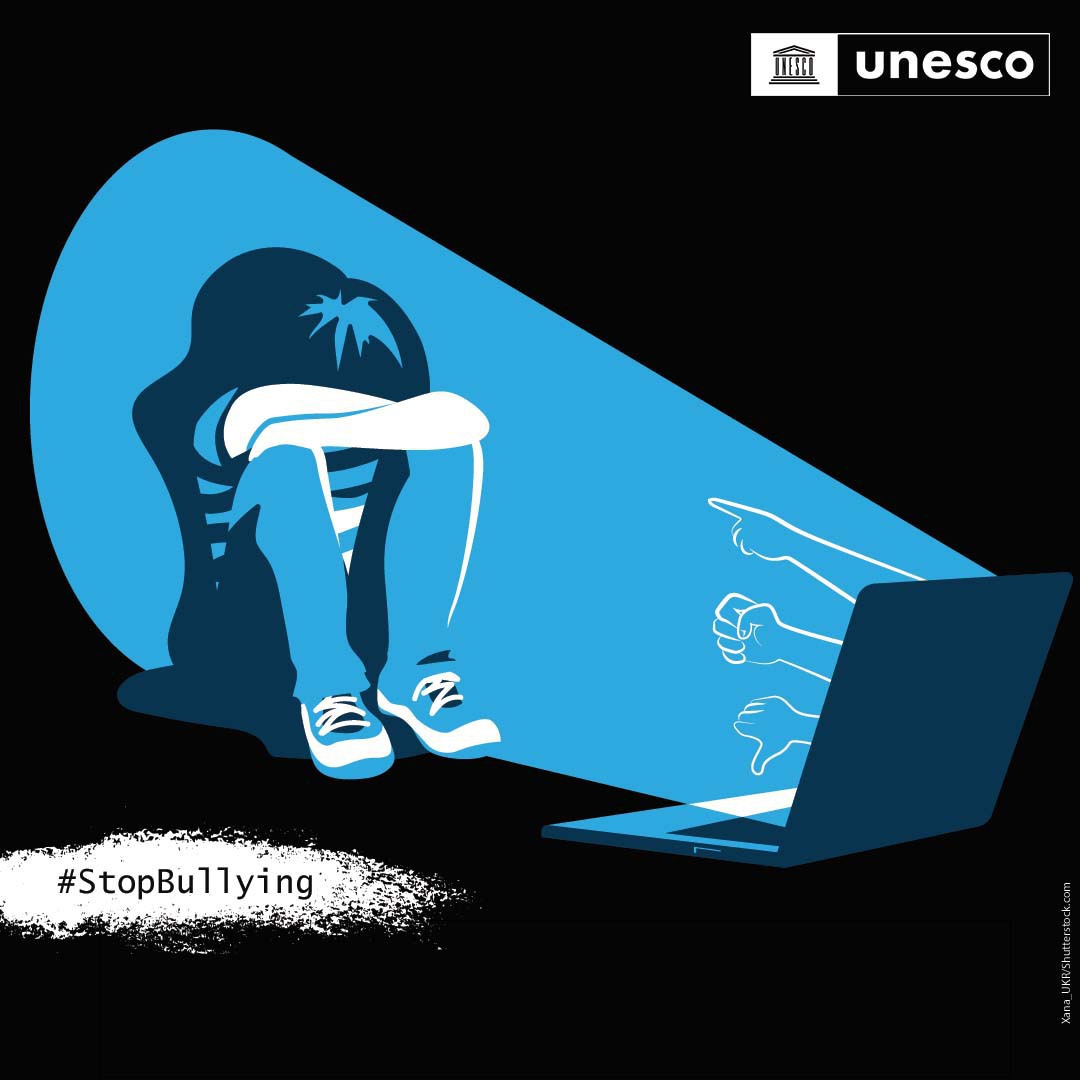العودة

The 2023 International Day against violence and bullying at school: No place for fear
اليونسكو
2023 - 12 - 04
In commemoration of the fourth International Day against violence and bullying at school, including cyberbullying observed on 2 November, UNESCO is shedding light on the profound connections between school violence, mental health, and learning outcomes.

In commemoration of the fourth International Day against violence and bullying at school, including cyberbullying marked on 2 November, UNESCO is shedding light on the profound connections between school violence, mental health, and learning outcomes. Under the theme “No place for fear: Ending school violence for better mental health and learning,” UNESCO is urging a more robust response to eliminate violence in and through education.
School violence, encompassing physical, psychological, and sexual aspects, along with gender-based violence, bullying, and cyberbullying, remains widespread. It has profound and enduring consequences on the mental health, well-being, and education of children and adolescents. Experiences such as violence and bullying are linked to anxiety, depression, suicidal thoughts, and self-harm. Both experiencing and perpetrating violence correlate with poor mental health, contributing to aggressive behaviours. Importantly, violence hampers learning, leading to absenteeism, lower grades, and increased dropout rates. Children subjected to bullying are twice as likely to feel lonely, face sleep disturbances, and contemplate suicide. Addressing school violence, including online bullying and gender-based violence, directly impacts learners' protection, mental health, and subsequently, their learning outcomes. Teachers may also witness or experience violence, reporting stress and fear in violent environments.
UNESCO's initiatives for safe learning environments
UNESCO employs research, advocacy, technical guidance, and capacity-building to ensure children and youth thrive in safe and supportive learning environments. Collaborating with partners, UNESCO developed guidance to promote mental health and well-being through a health-promoting school approach. The organization offers guidance on preventing and responding to school violence and produces evidence for countries to make informed decisions. UNESCO also leads partnerships such as the Global Working Group to end school-related gender-based violence, Safe to Learn, INSPIRE, the World Anti-Bullying Forum, and Power of Zero. These initiatives aim to create and foster safe, supportive learning environments.
Schools and education systems offer promising practices include establishing legislation, policies, and frameworks protecting learners from violence, supporting training on mental health and child protection for school staff, developing reporting mechanisms for incidents, integrating violence prevention and mental health into school curricula, ensuring a safe physical environment, and promoting positive socio-emotional environments through peer support and inclusive activities. Curriculum approaches such as socio-emotional learning (SEL) and comprehensive sexuality education (CSE) are essential. SEL helps develop self-awareness, self-control, and interpersonal skills, linking to improved academic performance and reduced violence. CSE, when addressing gender and power relations, can reduce sexual harassment and violence.
Role of teachers and education stakeholders
Teachers play a key role in creating health-promoting, safe learning environments. They provide education that strengthens social and emotional skills, ensure safety, model caring relationships, identify at-risk learners, and act as mental health focal points. Appropriate training is imperative to equip teachers with the tools to address mental health, protection, and gender and inclusion sensitively.
Creating a safe and supportive learning environment requires the involvement of various stakeholders, from school personnel and communities to parents, policymakers, and decision-makers. A holistic, whole-school approach, engaging with sectors like health and child protection, is essential to ensure learners' safety, mental health, and well-being.
In conclusion, UNESCO's call to end school violence for improved mental health and learning is a rallying cry for collaborative action, urging governments, educational institutions, parents, and communities to unite in creating safe and nurturing learning environments for all children.
أحدث المنشورات
القائمة الكاملةاليونسكو
المستقبل على المحك: لماذا الاستثمار في التعليم أمر بالغ الأهمية؟
يسلط هذا التقرير، الذي أعدّته اللجنة التوجيهية الرفيعة المستوى المعنية بالهدف الرابع من أهداف التنمية المستدامة (SDG4) بالتعاون مع الشراكة العالمية من أجل التعليم (GPE) ونُشر في عام 2024، الضوء على الحاجة المُلِحّة لتعزيز الاستثمار في التعليم كوسيلة أساسية لمواجهة التحديات العالمية، بما في ذلك تغيّر المناخ، والتطورات التكنولوجية، والتحوّلات الديموغرافية.
اليونسكو
المدن العربية تتألق في جوائز مدن التعلم لليونسكو لعام 2024
تُحرز المدن العربية تقدمًا كبيرًا في مجال التنمية المستدامة والتعلم مدى الحياة، مع تركيز متزايد على إنشاء بيئات تعليمية شاملة تُسهم في تحقيق الأهداف التنموية المحلية والعالمية. وقد احتفلت جوائز مدن التعلم لعام 2024، التي تُمنح من قِبَل اليونسكو، بهذه الجهود، مبرزةً المدن العربية التي تميزت في بناء مجتمعات تعليمية.
اليونسكو
مؤتمر اليونسكو العالمي الثالث للموارد التعليمية المفتوحة: تعزيز الوصول الشامل إلى المعرفة
انطلق مؤتمر اليونسكو العالمي الثالث للموارد التعليمية المفتوحة (OER) في 19 نوفمبر/تشرين الثاني 2024، في مركز دبي التجاري العالمي في دولة الإمارات العربية المتحدة، ليكون المرة الأولى التي يُستضاف فيها هذا الحدث في العالم العربي. نظّم مؤتمر اليونسكو بالتعاون مع مؤسسة محمد بن راشد آل مكتوم للمعرفة (MBRF)واستقطب أكثر من 500 مشارك ومشاركة من نخبة القادة العالميين، وصنّاع السياسات، وممثلي المؤسسات التعليمية، بما في ذلك وزراء، وأكاديميون، وخبراء من القطاع الخاص. وتركّزت المناقشات على مدار يومين حول تعزيز الاستفادة من الموارد التعليمية المفتوحة والتقنيات الناشئة، بهدف تحقيق وصول عادل وشامل إلى التعليم، وتقليص الفجوة الرقمية على الصعيد العالمي.
اليونسكو
الأمم المتحدة تحتفي في شهر ديسمبر/كانون الأول بحقوق الإنسان، والأشخاص ذوي الإعاقة، واللغة العربية
تُحيي الأمم المتحدة في شهر ديسمبر/كانون الأول ثلاث مناسبات بارزة تُعنى بحقوق الإنسان، وبحقوق الأشخاص ذوي الإعاقة، وباللغة العربيّة، ممّا يجعل هذا الشهر فرصةً عالميّةً للتفكير والعمل. وتقود اليونسكو الجهود لتعزيز التعليم الشامل، وحماية حقوق الإنسان، والاحتفاء بالإرث الثقافيّ واللغويّ للّغة العربيّة، من خلال سلسلة من الفعاليات والمبادرات.